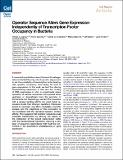Operator Sequence Alters Gene Expression Independently of Transcription Factor Occupancy in Bacteria
Author(s)
Garcia, Hernan G.; Boedicker, James Q.; Osborne, Melisa; Gelles, Jeff; Kondev, Jane; Phillips, Rob; Sanchez Ferro, Alvaro; ... Show more Show less
DownloadGarcia-2012-Operator Sequence Al.pdf (837.2Kb)
PUBLISHER_CC
Publisher with Creative Commons License
Creative Commons Attribution
Terms of use
Metadata
Show full item recordAbstract
A canonical quantitative view of transcriptional regulation holds that the only role of operator sequence is to set the probability of transcription factor binding, with operator occupancy determining the level of gene expression. In this work, we test this idea by characterizing repression in vivo and the binding of RNA polymerase in vitro in experiments where operators of various sequences were placed either upstream or downstream from the promoter in Escherichia coli. Surprisingly, we find that operators with a weaker binding affinity can yield higher repression levels than stronger operators. Repressor bound to upstream operators modulates promoter escape, and the magnitude of this modulation is not correlated with the repressor-operator binding affinity. This suggests that operator sequences may modulate transcription by altering the nature of the interaction of the bound transcription factor with the transcriptional machinery, implying a new layer of sequence dependence that must be confronted in the quantitative understanding of gene expression.
Date issued
2012-07Department
Massachusetts Institute of Technology. Department of Physics; Massachusetts Institute of Technology. Research Laboratory of ElectronicsJournal
Cell Reports
Publisher
Elsevier
Citation
Garcia, Hernan G., Alvaro Sanchez, James Q. Boedicker, Melisa Osborne, Jeff Gelles, Jane Kondev, and Rob Phillips. “Operator Sequence Alters Gene Expression Independently of Transcription Factor Occupancy in Bacteria.” Cell Reports 2, no. 1 (July 2012): 150–161.
Version: Final published version
ISSN
22111247